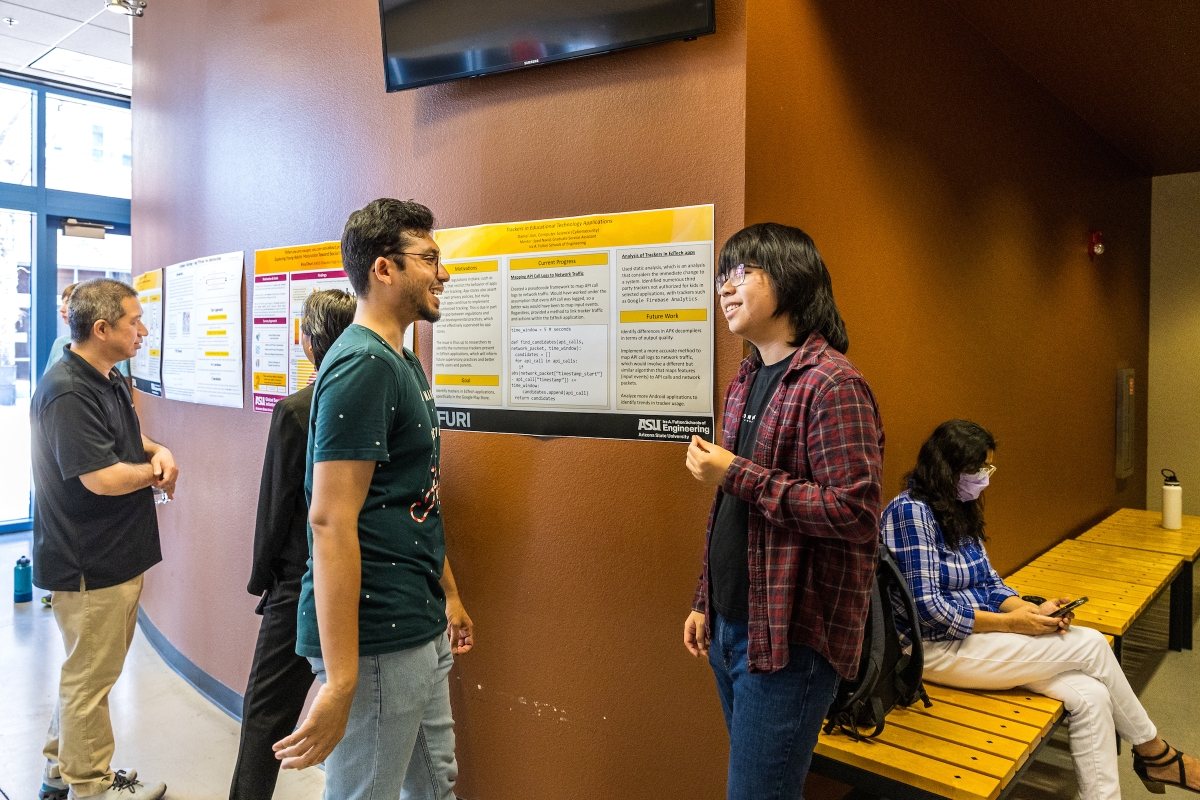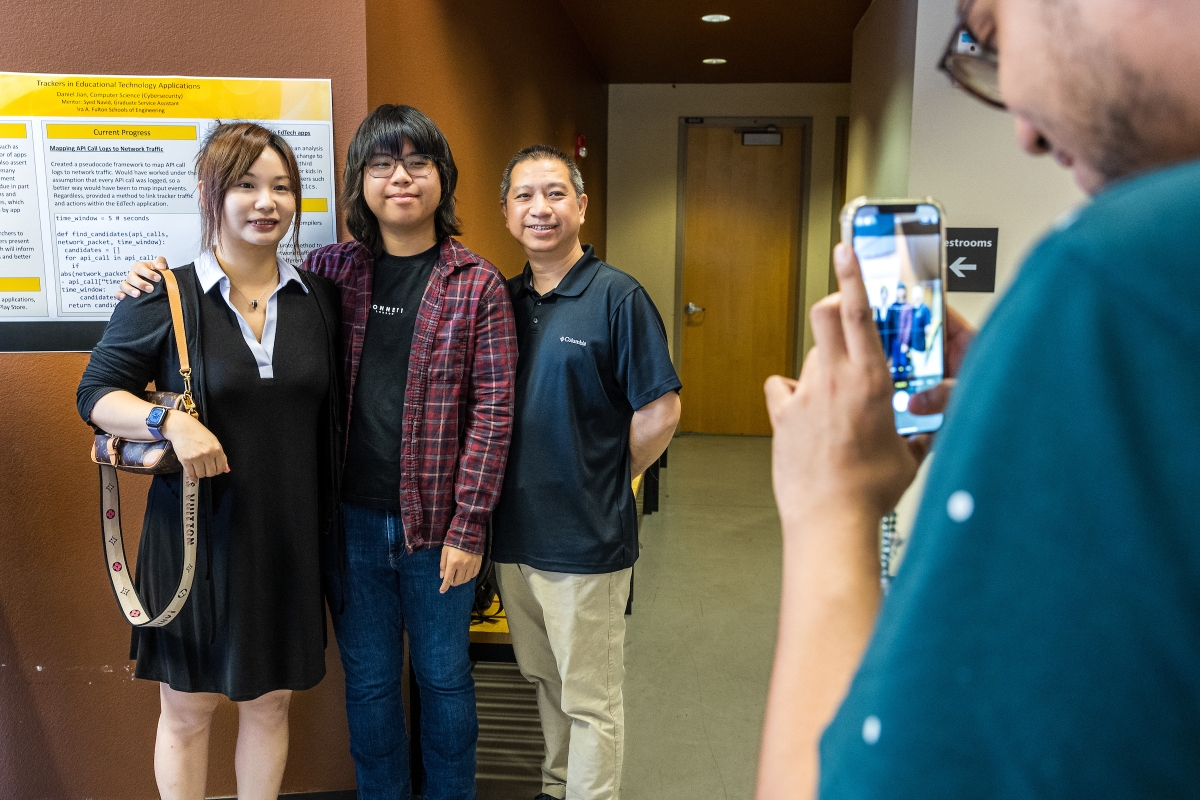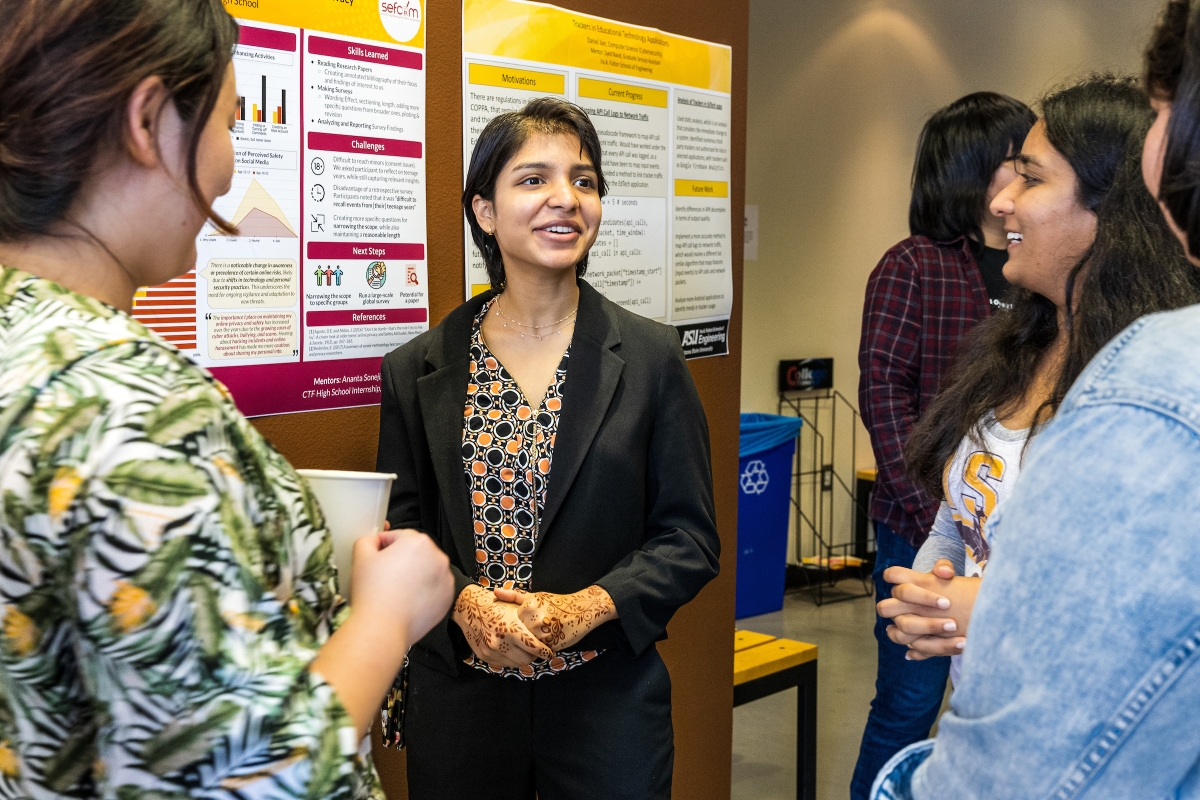High school interns take on cybersecurity research at ASU

Riya Dhuri (left), a senior at Basis Chandler High School, and Daniel Jian (second from right), a junior at Arizona Agribusiness and Equine Center, talk about their research projects on the final day of the eight-week Center for Cybersecurity and Trusted Foundations' summer high school research internship program. Photo by Charlie Leight/ASU News
Becoming a researcher is not a career path many high school students hear about when considering their future. But an Arizona State University internship aims to change that.
This summer, 23 Phoenix-area high school students were given the opportunity to participate in an eight-week cybersecurity research internship.
Now in its fourth year, the Center for Cybersecurity and Trusted Foundations' summer program partners high school students with graduate student mentors from the center and the School of Computing and Augmented Intelligence for collaborative research on campus.
The program wrapped up on Tuesday with the students presenting the results of their university-level research. The event took place at the Brickyard Courtyard in Tempe, which was overflowing with high school, college and graduate students, professors and parents. The interns discussed their experiences, the challenges they encountered and their findings.
“When I was an undergraduate, I had no idea what PhD-level research was like,” said Adam Doupé, director of the Center for Cybersecurity and Trusted Foundations. “The program is an excellent way to expose high school students to research.”
ASU is a major research university, ranking fifth in the U.S. for research expenditures among universities without a medical school. The cybersecurity internship provides multiple opportunities for participants, including exposure to:
- Emerging concepts and technologies.
- Prominent researchers in a world-class research lab.
- Computer science programs for students considering attending ASU.
"It allows students to understand the latest in cybersecurity and really get their hands dirty writing code and solving complex cybersecurity challenges,” said Doupé, who is also an associate professor in the School of Computing and Augmented Intelligence.
Jackie LeFevers, assistant director at Center for Cybersecurity and Trusted Foundations, said the internship "helps students get into the research mindset and the possibilities there if they continue to follow the path."
Daniel Jian was one of those students. During the eight weeks, he researched applications that performed unwarranted tracking — especially on children — despite the regulations and policies that are in place. Jian discovered which unauthorized third-party trackers were being used to monitor kids.
“I’m an advocate for internet privacy,” said Jian, 16, of Litchfield Park. “If we can’t expect companies to respect children’s privacy, how can we ensure anyone’s privacy?”
Jian, a junior at Arizona Agribusiness and Equine Center at Estrella Mountain, analyzed the code of the apps to find the unauthorized trackers. At the end of the internship, he said, “I am satisfied with the program and proud of what I did.”
Prior to the internship, Jian had considered going into academia. Did the internship help with his decision-making process?
“Absolutely,” he said. “It (the internship) has really cemented my desire. It gave me a taste of research, which helped me with my future decisions. It allowed me to see how research can make an impact — especially on things I really care about.”
The high school junior has 75 college credits from dual enrollment classes and plans to have two undergraduate bachelor’s degrees when he graduates from high school. He intends to apply for graduate studies in data systems, possibly at ASU.
Riya Dhuri, 17, another participant in the internship program, studied the privacy precautions taken by people ages 18 to 22 and discovered that those on the younger end of this group were more reckless and unsafe in their practices — but evolved over time, becoming more cautious and careful in their technology use.
Dhuri attends Basis Chandler High School and is interested in medicine and engineering. She said the internship “was a great opportunity to learn the research process.”
One of her mentors, Ananta Soneji, said the internship helps students figure out what career they may be interested in prior to entering college.
“It doesn’t mean they have to go into computer science, but it gives students the opportunity to test the waters and find out whether they want to be involved in research in the future,” said Soneji, who is pursuing a PhD in computer science at ASU.
Jian and Dhuri were two of more than 100 students who competed for the coveted internship, which provides a stipend of $1,800 to participants. This year, there was a nearly 300% increase in applicants over last year.
“It speaks to the talent of the students in the Phoenix area,” Doupé said during the poster presentations. "I am blown away by the amazing research that our interns conduct during the eight weeks that they are part of our program. ... (I hope) it will inspire the next generation of scientists.”
More Science and technology

Unlocking new pathways in regenerative medicine
In the quest to advance regenerative medicine, the Harris Lab at Arizona State University is making groundbreaking strides. Focused on tissue regeneration and the intricate biology of cell death, the…

Brilliant move: Mathematician’s latest gambit is new chess AI
Benjamin Franklin wrote a book about chess. Napoleon spent his post-Waterloo years in exile playing the game on St. Helena. John Wayne carried a set and played during downtime while filming “El…

ASU team studying radiation-resistant stem cells that could protect astronauts in space
It’s 2038.A group of NASA astronauts headed for Mars on a six-month scientific mission carry with them personalized stem cell banks. The stem cells can be injected to help ward off the effects of…




